 For close to 15 years, Wisdom Works has enjoyed advancing strategies for wellbeing in companies and communities, as well as the individuals who lead them. We’re proud to have helped clients shape and implement initiatives which boost their reputation, effectiveness, or growth. Those same efforts have further benefits, like promoting active healthy lifestyles, creating eco-friendly supply chains, or building constructive relationships with stakeholders. And through our many experiences, we’ve learned that sustainability is a core plank of every effective strategy for wellbeing. So I’m delighted to announce that we’ve amped up our strategy development services with a Sustainability Practice helmed by Karen Flanders. (You can read more about Karen’s new role with Wisdom Works here.)
For close to 15 years, Wisdom Works has enjoyed advancing strategies for wellbeing in companies and communities, as well as the individuals who lead them. We’re proud to have helped clients shape and implement initiatives which boost their reputation, effectiveness, or growth. Those same efforts have further benefits, like promoting active healthy lifestyles, creating eco-friendly supply chains, or building constructive relationships with stakeholders. And through our many experiences, we’ve learned that sustainability is a core plank of every effective strategy for wellbeing. So I’m delighted to announce that we’ve amped up our strategy development services with a Sustainability Practice helmed by Karen Flanders. (You can read more about Karen’s new role with Wisdom Works here.)
Named one of the Top 10 Women of Sustainability, Karen’s experience reinforces and extends Wisdom Works’ commitment to practice what we preach. I view sustainability as the yin to wellbeing’s yang, creating a balanced approach to progress. Way back in 1987 the United Nation’s Brundtland Commission defined sustainability as taking actions that meet the needs of the present without compromising the ability of future generations to meet their own needs. Sustainability is about acknowledging the limited and oftentimes scarce resources in which we live. To lose sight of sustainability is to act in ways that rob our ability to survive. Today we finally realize the role sustainability plays on three levels for us: as individuals, organizations, and communities.
Sustainability for individual leaders means looking at the downstream implications of our behaviors within our own lives and leadership. According to Dr. Terri Kennedy, President of Power Enterprises, this means minimizing our individual toxic load and lifestyle footprint to maximize our personal effectiveness, wellbeing, and resilience. How can we do this? To list just a few simple ways, we can: reduce energy vampires in our homes (and lives), clear the clutter off our desks, recycle, eat less junk food, and strategically disengage from everyday routines. Not only will these actions benefit us personally, they’ll make us better role models, positively influencing others.
Sustainability for organizations – When a company emphasizes sustainability it seeks the truth about the negative impacts of current business activities. The scope of this seeking is often immense; corporate audit and tax firm KPMG says that population growth, climate change, wealth inequities, water scarcity, and food insecurity are among the top ten sustainability megaforces which a global company must address just to operate. Fortunately, an investment in sustainability can pay off through corporate reputation, operational efficiencies, and financial performance. When the U.K. research house, Maplecroft, tracked climate-focused sustainability efforts of companies worth more than $1 billion, they found that over three years the leading 100 companies outperformed the Standard & Poor’s 100 Index.
Sustainability at the level of community – Successful communities across the globe— from low-carbon cities in China to newly-formed eco-developments such as Serenbe— are proving that sustainability issues are fundamental. Cities and towns are reducing sprawl through smart growth strategies, refurbishing abandoned buildings rather than building new ones, and protecting water and wildlife as an integral part of city planning. This is all part of a very conscious, deliberate sustainability aim: To improve residents’ quality of life by applying principles of social equity, economic prosperity, and environmental quality right where we live, work, and play.
Like the two complementary halves of the yin/yang circle, I’ve found in my practice that the motivation to achieve sustainability fosters ripe conditions for enhancing wellbeing. And a focus on wellbeing at all levels means more sustainable business practices, more thriving communities, and leaders who grow and prosper in both their personal and professional lives. To me, that paints a dynamic picture.
Image by Guadalupe Cervilla

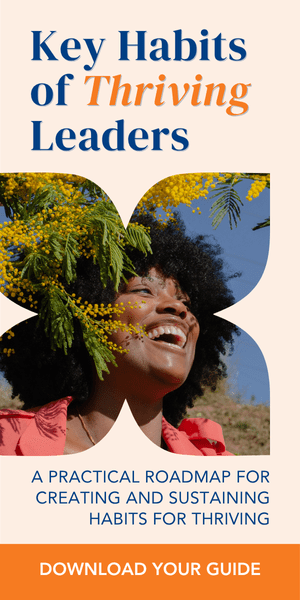
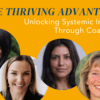
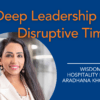
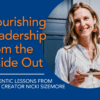
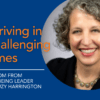

Wonderful, Renee!
Thank you,
Pamela
Thank you, Pamela! A question for you: what is one thing you do to enhance your personal sustainability? I’d love for you to share that with the Wisdom Works’ blog readers.